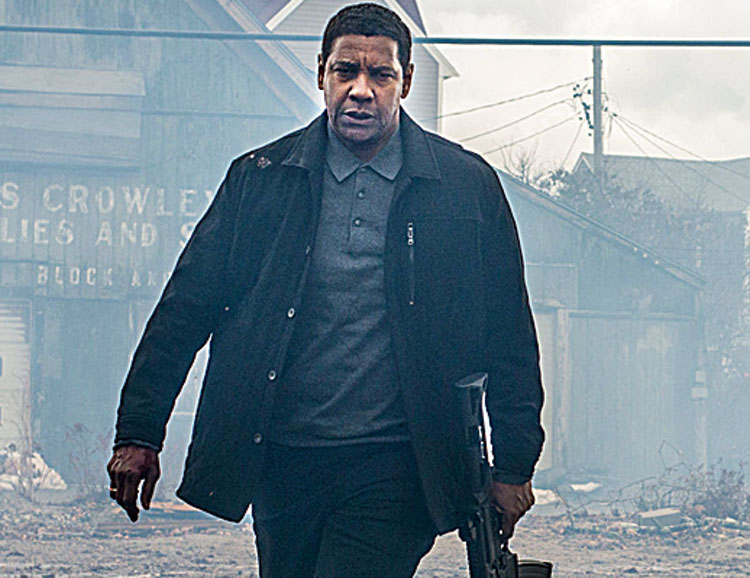Vengeance is mine, saith the lord, but that was before Denzel Washington stepped up. One of the reigning symbolic patriarchs of genre cinema — a fraternity that includes Clint Eastwood, Liam Neeson and the rather less-convincing Bruce Willis — Washington has been meting out extreme punishment for some time. He’s especially persuasive playing the kind of brutal redeemers who unblinkingly snuff out the murderous many to save a single innocent, which is exactly what he does at the start of The Equalizer 2.
The violently avenging hero is a durable American archetype, and denying it — and the indefensible, irresistible pleasures of watching primitive justice in action — is probably pointless at this stage in our history. For decades, the TV producer Dick Wolf, the diabolical genius behind the Law & Order franchise, has profited from the reassuring spectacle of professionals balancing (usually) the scales of justice. Although the holy spirit of Gregory Peck’s Atticus Finch hovers over many cinematic courtrooms, movies have often seemed more satisfying when they forget order and the law and serve up justice as cold (and blood-red) as possible.
We’re clearly not meant to worry about the niceties — legal, ethical, narrative — while watching The Equalizer 2. We are meant to watch, and to cheer. It’s forgivable if you don’t remember anything about the original (I didn’t), which blurs with all the other movies in which Washington has played characters who righteously or just summarily deliver death to the deserving: The Magnificent Seven, The Book of Eli, Man on Fire and so on. He has played his share of decent, morally assured and even bland characters, but, like so many of the greatest American male stars, violence becomes him.
In some ways, Washington plays the role once embodied by John Wayne, except that the fight now usually takes place in cities instead of the wild West of Hollywood’s own Manifest Destiny.
Antoine Fuqua, the excitable director of The Equalizer 2, traces a line between his star and the Duke by alluding to one of the most famous shots in film history: Wayne framed in a doorway in The Searchers, the closing frontier stretched out behind him. The allusion is more ritualistic nod than anything else, and there’s little otherwise in The Equalizer 2 that connects it to The Searchers other than the bluntly obvious: the near-mythic status of its stars and our very American love of violence.
However much separates these two movies — story, craft, technique, production context, the larger world, you name it — they both hinge on a familiar American defender-saviour: the resolute, physically imposing, quite possibly deranged solitary older man who sets wrongs right. In each film, the hero roughly takes a younger, less-hardened man under his wing, giving the audience a surrogate, someone to cling to when things or the avenger get too weird or uncomfortably rough. That role here is played with glimmers of feeling by Ashton Sanders, the memorably delicate teenage protagonist of Moonlight.
In The Equalizer 2, Sanders plays Miles, a student and would-be artist who’s started to stray and who lives in the same homey Boston apartment complex as Washington’s character, Robert McCall. To his neighbours, McCall surely seems a good neighbour: reserved, helpful, friendly without being pushy. He watches over the building with a sharp eye — Fuqua has a serious ocular thing going on in this movie — and a secret arsenal. He draws from his stash now and again when he’s not quietly reading in his monastic apartment or driving for Lyft, picking up souls who, with one unruly exception, he benevolently observes in the rearview mirror.
Written by Richard Wenk (his name can be found on some of Washington’s earlier sanguineous vehicles), The Equalizer 2 has a whole lot going on. Mostly, it has McCall and the characters who rotate around his divine radiance, notably Miles, who’s in need of a drastic course correction. (A believer in tough love, McCall gives him a stern talking-to delivered at gunpoint and a copy of Ta-Nehisi Coates’s book Between the World and Me.) There’s also Sam (Orson Bean), a shameless cliche in need of rescue and a rewrite, and Susan (an effective Melissa Leo), McCall’s only friend and a retired Central Intelligence Agency officer who still takes care of classified business.
The story skips from Turkey to Boston and elsewhere as McCall smoothly juggles crises, regularly pausing to break someone’s bones. Fuqua handles all this with his customary visual flamboyance, using different speeds, off-kilter angles and ophthalmological close-ups of McCall’s eyes to convey his near-mystical abilities.
Washington is especially strong when he trusts his director, as he did with Tony Scott and does with Fuqua. Like all great actors, Washington commits to the performance, but every so often he also breathes fire, imbuing a scene with such shocking ferocity and bone-deep moral certitude that everything else falls blissfully away.











